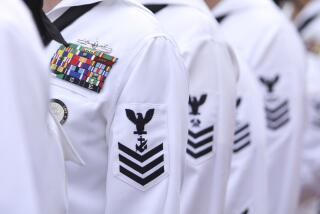357 Tijuana Prostitutes Tested for AIDS Not Infected, Navy Says
- Share via
SAN DIEGO — A unique collaborative study by Mexican health officials and U.S. Navy personnel has found that none of the 357 Tijuana prostitutes tested were infected with the AIDS virus, the Navy said last week.
The results, coupled with similar findings from a separate study of prostitutes and other Mexican citizens at high risk for AIDS, would indicate that infection is not prevalent among prostitutes in the border city--a longtime destination for U.S. thrill-seekers.
“What it says is that there’s a very low risk factor,” said Chief Craig Huebler, a Navy spokesman in San Diego.
The two recent studies reflect a growing collaborative effort between U.S. and Mexican health officials concerned that the border region could make the spread of AIDS easier.
Plea to Navy
The Navy became involved, Huebler said, at the request of health authorities from the city of Tijuana and the Baja California state government, who lack the volume of sophisticated testing devices and methods found in U.S. institutions.
Mexican officials selected the participants in the survey and took the blood specimens, Huebler said, while the Navy’s role principally involved the testing of the blood for evidence of the AIDS virus.
The samples were taken almost a year ago, Huebler said, but the results were only finalized last week.
The Navy study tends to confirm the results of a previous bi-national AIDS initiative in Tijuana, which was conducted by Mexican health officials and the California Department of Health Services. That study found that only two of 415 prostitutes surveyed were infected with the AIDS virus, said Dr. Abram Benenson, a professor at the San Diego State University School of Public Health.
More to Read
Sign up for Essential California
The most important California stories and recommendations in your inbox every morning.
You may occasionally receive promotional content from the Los Angeles Times.













